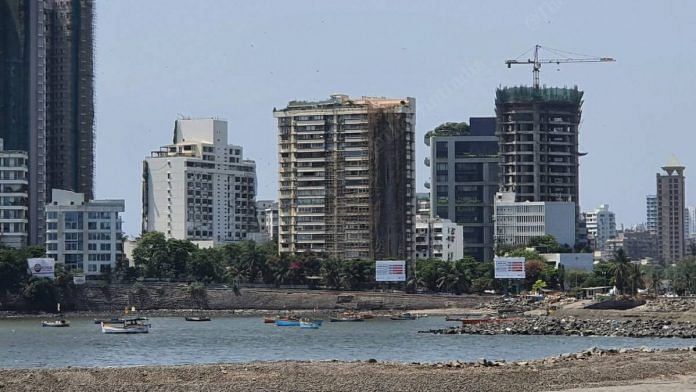Mumbai: An urban health data centre with basic histories of people, density-based planning while redeveloping slums, rental housing for migrants, and television, radio and podcasts for digital education.
These are some of the policy interventions that 25 experts, including former civil servants, across sectors such as health, transport, housing, education and economy, have suggested to aid Mumbai’s recovery, one of the cities worst affected by Covid-19.
The suggestions have been compiled in a 32-page report titled ‘Resurrecting Mumbai,’ which was submitted to the Maharashtra government earlier this month.
“Those of us who work in the policy space know there are a lot of gaps in our policy issues and Covid has actually exposed its underbelly,” said Sayli Udas-Mankikar, one of the three conveners of the exercise.
Mankikar, a former journalist and senior fellow at the Observer Research Foundation, added, “It is not an effort to criticise the government, but to supplement its efforts. We have already submitted it to the state government and will soon be given the opportunity to present it to the chief minister.”
The panel of experts focused on five areas that require policy changes — health, education, transport, housing and economy.
The experts who contributed to the report include former bureaucrats Jayant Banthia, Gautam Chatterjee and Malini Shankar, economists Dr Abhay Pethe and Kanika Pasricha, urban planning experts P.K. Das, Neera Adarkar and Shirish Patel, as well as serving government officials such as Mumbai Metro Rail Corporation Executive Director R. Ramanna and Mumbai civic body’s Chief Education Officer Mahesh Palkar, among others.
Mumbai has recorded 1,42,099 Covid-positive cases as of Friday, including 1,217 new cases. The city, which is adding over a thousand patients to its Covid tally every day, is currently under a partial lockdown.
Also read: Inside Navi Mumbai’s ‘Covid war room’, data and logistics lead the fight against the virus
‘Health data centre, disaster protocol for pandemics’
The experts’ report has suggested setting up an urban health data centre, comprising the basic health data of citizens, an online record of their health histories, especially for those with peculiar illnesses that need constant medical attention, even during emergencies.
“Primary health posts lack adequate medical data and information about the profile of inhabitants in unauthorised colonies, making contact tracking and tracking people with comorbidities difficult. It was also difficult for the more vulnerable sections like pregnant women, senior citizens, the physically and mentally challenged and those with special health needs,” said the report, a copy of which is with ThePrint.
The panel of experts has also recommended a clear division of duties between the civic body, state and the Centre — with the civic body managing only primary healthcare, state managing secondary healthcare and the central government taking charge of the tertiary and specialised healthcare.
There also needs to be a proper referral system in place with primary healthcare centres referring patients to bigger hospitals. Slum outreach centres for healthcare too need to be strengthened and made more accessible, and there needs to be a healthcare protocol in disaster management, including a public-private hospital circuit that gets activated during emergencies.
“In the initial months, it was seen that the hospitals were overburdened during the pandemic and there was shortage of key equipment like ventilators. Primary healthcare posts played a minuscule role … There was a particular distress with non-Covid patients needing dialysis/chemotherapy with illnesses that need continuous hospital visits,” the report stated.
In the report, the panel of experts has also noted that only 13 per cent of the Brihanmumbai Municipal Corporation budget is set aside for healthcare, and most of it for administration and maintenance. This needs to be increased, especially for primary healthcare centres.
School classes in smaller neighbourhood-level groups
With the medium of education having undergone a drastic change due to the pandemic, the panel of experts has recommended a slew of measures to make digital education easier and as widespread as possible.
The experts have recommended pressing tools such as television, radio and podcasts into service, breaking classrooms down into smaller common neighbourhood-level groups as well as capacity building and mental health sessions for teachers to help them cope with the new method of teaching.
The suggestions also called for roping in non-government volunteers to understand the issues in digital learning in slums and to check digital learning material sent to children on WhatsApp.
“Instead of children going to school, the schools can come to children if the government insists that large residential complexes have a pre-primary, primary level school too. Or, there can be smaller ward-level schools,” said Prachi Merchant, senior urban planner, who has worked with the BMC and is one of the three conveners of the report.
“We generally need to rethink the concept of learning, longer term. For example, why can’t 10th and 12th standard exams be made available for students four times a year,” she added.
Besides health and education, the experts have also recommended revamping the way slums are developed, working more on density-based planning, providing low-cost rental housing for migrant labour on government lands, subsidies and tax breaks for the small and medium enterprises, and a revamp of the labour department.
The experts have also suggested strengthening Mumbai’s public bus service, and emphasising on more public transport with social distancing norms.
Also read: Both cities have taken a hard Covid knock, but Mumbai beats Delhi with data transparency



